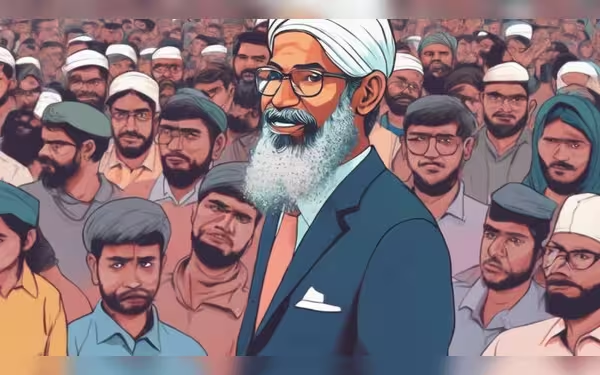Thursday, November 7, 2024 05:47 AM
Pakistan's Struggle Against Misogyny and Political Turmoil
- Zakir Naik's visit sparks controversy and misogyny.
- Protests erupt after alleged campus rape incident.
- Political leaders dismiss victims, perpetuating societal issues.
 Image Credits: thefridaytimes
Image Credits: thefridaytimesPakistan faces political turmoil and rising misogyny, highlighted by Zakir Naik's visit and recent campus rape protests.
In today's world, we are witnessing a troubling trend where basic human rights are being eroded, and innocent lives are lost daily. The digital age, which should ideally promote the free flow of information, is instead plagued by censorship and misinformation. This situation is evident in various global conflicts, including the ongoing crisis in Palestine. However, amidst this chaos, there is a glimmer of hope as younger generations become increasingly aware of the injustices that surround them. Pakistan, a nation grappling with its own set of challenges, serves as a microcosm of these global issues.
Over the past month, Pakistan has been a stage for political turmoil, censorship, and the persecution of minorities, all of which reflect the pressing problems faced worldwide. A particularly alarming incident involved the arrival of Zakir Naik, a controversial religious preacher, who was welcomed as a state guest. Naik, known for his inflammatory remarks, made headlines with his absurd complaint about being charged for excess luggage by Pakistan International Airlines (PIA), claiming that non-Muslims in India would have treated him better. This public humiliation did not deter the Pakistani government from rolling out the red carpet for him.
During his visit, Naik took to national television, making offensive statements that further perpetuated misogyny. He suggested that women who do not adhere to "Islamic values" are inviting rape upon themselves and made bizarre claims about animal waste being permissible for Muslims to consume. In a country where derogatory songs about women are part of the cultural landscape, Naik's remarks were particularly damaging.
Shortly after, Naik was invited to an event honoring orphaned girls but left the stage abruptly, stating that his religious beliefs prohibited him from interacting with "na-mahram" (non-permitted) girls. This behavior not only created unnecessary drama but also demoralized the young girls he was meant to inspire. Misogyny disguised as religious rhetoric is a dangerous toxin that has deeply infiltrated Pakistan's cultural fabric.
One of the few positive moments during Naik's visit came when Kamran Tessori, the Governor of Sindh, publicly contradicted one of Naik's controversial statements regarding the Battle of Karbala. However, the damage was already done. Following Naik's visit, there was a disturbing rise in reports of rape and sexual abuse across the country, with a particularly horrifying case in Lahore. A female student from Punjab Group of Colleges was allegedly raped by a security guard on campus, prompting students to protest.
In response to the protests, the education minister claimed that CCTV footage had been tampered with, while the school principal threatened students who spoke out. The situation escalated when police were deployed to suppress the protests, leading to baton charges that injured many students and resulted in over 250 arrests. Maryam Nawaz, Pakistan's first female Chief Minister, attempted to address the incident but instead added to the controversy by denying the rape allegations and dismissing the protesters as opposition party workers.
Such harmful rhetoric from leaders highlights how ingrained misogyny is in Pakistan's political and social landscape. The implications of these statements are profound, as they suggest that victims of sexual assault are somehow at fault. If there is indeed no case, why not release the CCTV footage to clear the air? And if Naik's statements did not influence anyone's actions, why do the thoughts of these predators align so closely with his?
This past month serves as a stark reminder of how Pakistan, and indeed the world, grapples with pressing issues. Innocent individuals continue to suffer while those in power remain untouched. Facts are distorted, misogyny thrives, and society feels increasingly fractured. As humans, we are exhausted by the cruelty and injustice that permeate our lives. What we truly desire is a world united by love—a world where every individual, regardless of caste, color, creed, or gender, feels safe and valued.













